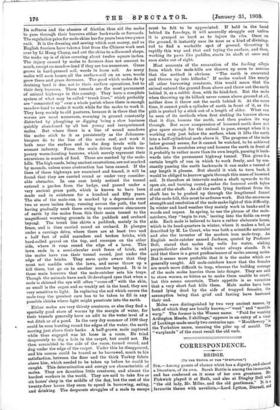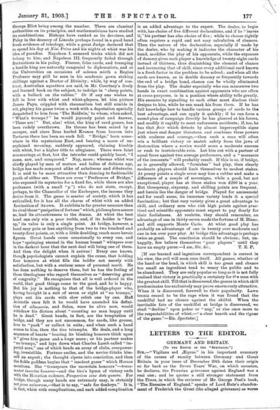• CORRESPONDENCE.
BRIDGE.
[TO THZ EDITOR OP THB "SPECTATOR:1
SIE,—Among games of chance whist has a dignity, and almost a literature, of its own. Sarah Battle is among the immortals, and has conferred on it some of her own greatness. Mr. Pickwick played it at Bath, and also at Dingley Dell with "the old lady, Mr. Miller, and the old gentlemen." It's I Sayeurite theme with novelists,—Lord- Lytton,. Disraeli, and George Eliot being among the number. There are classical authorities on its principles, and mathematicians have studied its combinations. Bishops have ranked as its devotees, and Paley in the deanery of Lincoln perhaps found in a good hand fresh evidence of teleology, while a great Judge declared that to spend his day at Nisi Prins and his nights at whist was his idea of paradise. Napoleon I. annexed tricks which did not belong to him, and Napoleon HL frequently failed through fluctuations in his policy. Finesse, false cards, and trumping a hostile king are naturally congenial to diplomatists, and at the Universities on occasions of solemn mirth a Regius Professor may still be seen in his academic gown staking shillings against a Doctor of Divinity ; while, by way of con- trast, Australian squatters are said, in Mr. Courtney's lively and learned book on the subject, to indulge in "sheep points, with a bullock on the rubber." Or if any one wishes to fall in love with whist and whist-players, let him picture James Para, crippled with rheumatism but still nimble in wit, playing his game twice a week with a deputation specially despatched to him from The Baldwin,' to whom, when asked, "What's trumps ?" he would joyously point and answer, "These are!" But, alas ! whist, the king of card games, has been rudely overthrown. Its throne has been seized by a usurper, and since Zeus hurled Kronos from heaven into Tartarus there has been no such fall. "Bridge," born some- where in the mysterious East, and bearing a name of un- explained meaning, suddenly appeared, claiming kinship with whist, but a higher title to allegiance. There were faint murmurings at first, but the intruder could quickly boast, "I came, saw, and conquered." Nay, more ; whereas whist was chiefly played by men of mature and ladies of dubious age, bridge has made conquest alike of subalterns and debutantes. It is said to be more attractive than dancing to fashionable youth of either sex. There are even "Professors of Bridge," who expound its mysteries for a fixed fee, while there are also professors (with a small "p") who do not state, except, perhaps, to the Chancellor of the Exchequer, the income they derive from it. The game is master of society, which it has enthralled, for it has all the charm of whist with an added fascination of its own. It exhibits in far greater measure than its rival those "peripeties of fortune" which, philosophers assure us, lend its attractiveness to the drama. At whist the best hand can only win a poor treble, and, if its holder is "four up," its value is only a single point. At bridge, however, a hand may gain or lose anything from two to two hundred and twenty-four points, or, With a little doubling, reach more heroic figures. Great hands come occasionally to every one, and hope "springing eternal in the human breast" whispers ever in the darkest hour that the next deal will bring one of them. Add then the delight when it arrives ! Every one knows, though psychologists cannot explain the cause, that holding four honours at whist fills the holder not merely with satisfaction, but with a curious: sense of personal merit: He has done nothing to deserve them, but he has the feeling of those theologians who regard themselves as "deserving grace of congruity." He recognises that all is well ordered in the world, that good. things come to the good, and he is happy. But his joy is nothing to that of the bridge-player who, having brought in a suit of seven or eight at "no trumps," plays out his cards with slow relish one by one. Hatt Aristotle once felt it he would have amended his defini- tion of itilaacoyia, and Solon, were he alive now, would withdraw his dictum about "counting no man happy until he is dead." Great hands, in fact, are the temptation of bridge, and they are not uncommon, for cards, like grouse, love to " pack " or collect in suits ; and when such a hand comes to him, then the tiro triumphs. He deals, and a long sequence of hearts "bearing its lluShing honours thick upon it" gives him game and a huge score ; or his partner makes "no trumps," and lays down what Charles Lamb called "im- perial aces," one of which heads an array of clubs, overpower- ing, irresistible. Fortune smiles, and the novice thinks him- self an expert ; the thought ripens into conviction, and then the fickle goddess begins that " insolent game" which Horace mentions. She "transposes the uncertain honours "—trans- mutat ineertos honores—and the tiro's hymn of victory ends with the Horatian cadence, Pauperient sine dote quaeko. For bridge, though many hands are extremely easy, is certainly not pens asinorum,—that is to say, "safe for donkeys." It is, Hi fact, whist with complications, and each added complication is an added advantage to the expert. The dealer, to begin with, has choice of five different declaratiens, and if he "leaves it," his partner has also choice of five ; while to choose rightly often requires a rapid and not easy calculation of chances. Then the nature of the declaration, especially if made by the dealer, who by making it indicates the character of his band, modifies the play of his opponents, while the exposure of dummy gives each player a knowledge of twenty-eight cards instead of thirteen, thus diminishing the element of chance and increasing that of skill, since every additional card known is a fresh factor in the problem to be solved ; and when all the cards are known, as in double dummy or frequently towards the end of a bridge hand, chance can be wholly eliminated from the play. The dealer especially who can manceuvre two hands in exact combination against opponents who are often at cross-purposes, is in a position where ability tells greatly. His enemies by signalling to each other must disclose their designs to him, while be can mask his from them. If he has full knowledge how to handle various groups of cards to the best advantage, and can apply it quickly; if he can form a, sound plan of campaign directly he has glanced at his forces, and modify it rapidly to meet unforeseen accidents ; if, too, he has that flair which detects by almost imperceptible signs just where real danger threatens, and combines these powers with coolness and courage,—then such a man will often win a brilliant victory or snatch safety from the jaws of destruction where a novice would score a moderate success or rush to irretrievable ruin. Let him cut with a partner of equal force against two average performers, and a "massacre of the innocents" will probably result. If this is so, if bridge, as is generally allowed, " furnishes " bad play, then clearly moderate players should limit themselves to modest stakes. At penny points a single error may lose a rubber and make a difference of a couple of sovereigns, while a good, but not exceptional, player has at these stakes won 2200 in a year. But threepenny, sixpenny, and shilling points are frequent, and herein lies the danger of bridge. Played for amusement and for small Bums, its immense variety lends it a special fascination; but that very variety gives a great advantage to skill, and ordinary men who risk high points against prac- tised and scientific opponents must expect to pay dearly for their foolishness. At roulette, they should remember, an advantage of one in thirty-seven made the fortune of M. Blanc, and still supports Monte Carlo. At whist _good play has probably an advantange of one in twenty over moderate and one in ten over poor play. At bridge this advantage is perhaps twice as great. The conclusion should be obvious ; but, un- happily, few believe themselves "poor players" until they have an empty purse.—I am, Sir, &c., T. E. P.
[If our learned and ingenious correspondent is correct in his view, the evil will soon cure itself. All games, whether of the hand or the head, in which skill is too great and chance too small an ingredient tend to weary the public and to be abandoned. They are only popular so long as it is That fully realised that victory is practically a certainty for as man with the greatest skill. Till that is discovered, the games in which skill predominates too exclusively may prove enormously attractive. When it is discovered, farewell to their popularity. Lawn tennis ceased to be the rage when it was found that the unskilful had no chance against the skilful. When the inevitable fate of the unskilful at bridge is discovered, we shall " decline " upon poker or "nap," or rise once more to the respectabilities of whist,—" a clear hearth and the rigour of the game."—En. Spectator.]























































 Previous page
Previous page